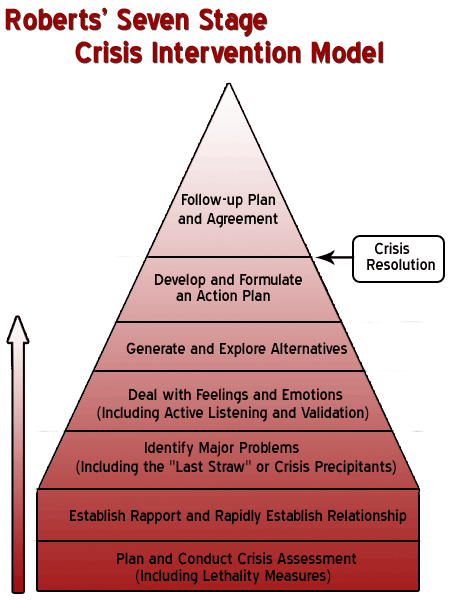Drug Abuse: How to Stage an Intervention

For those who haven't seen the "Intervention" true life documentary series on A&E, an intervention is a counseling technique designed to encourage someone who is suffering from addiction to seek professional help. Although typically used for drug addiction and alcoholism, interventions can also be helpful for someone with an eating disorder and people who self-injure, or cut, as well as those addicted to gambling or shopping. Interventions are a direct confrontation. The addict's loved ones congregate in a safe, familiar place, sometimes with the help of an intervention specialist, to express how much they love the person and plead with him to seek counseling. Staging an intervention can be an incredibly useful, successful tool if exercised properly.
Planning the Intervention
When an addict has reached rock bottom, it is evident to everyone around him. His life has spun out of control and he is not longer capable of keeping his addiction at bay. He may be stealing, lying or lashing out, and at the very least he is only a shell of the person he once was. Approach the people who are closest to him with the idea of an intervention. Remember, you want to gather the loved ones who are most important to him, so don't let your personal biases interfere. For example, if the addict is your son, and your son is gay but you vehemently disapprove of his sexual orientation, DO NOT exclude his boyfriend from the ordeal. It is important to gather the people for whom the addict has the greatest respect, whose opinions he values, and who would have the biggest impact on his life should he lose them. There's no need to have the entire family and 20 of his friends present. A small, intimate group of those who are closest to him is best, anywhere from 3-6 individuals and no small children. Explain to the friends and family members that you will be staging an intervention and asking him to get help immediately, and make sure they understand that the intervention is to come as a surprise. It is essential that the addict does not find out beforehand, as he may make an attempt to avoid the confrontation by simply running and hiding.
Finding an Interventionist
Once the group is gathered, you may want to meet with an intervention specialist, or interventionist. An interventionist is an addiction therapist who can help guide you through the process as well as be present on the day of the intervention. There are many resources available to help you finding an interventionist.
- Contact a local drug or alcohol treatment center in your hometown and ask if they offer interventionist services
- Call (800) 559-9503, the number for the Nationwide Intervention Assistance program
- Visit www.addictionintervention.com or call them at (800) 561-8158
- Visit www.cdinterventions.com or call them at (877) 256-1179
- Visit www.drug-intervention.com for an online consultation, or call them at (877) 254-3348
- Visit addictionrecoverynet.com or call them at (800) 231-8021
Pre-intervention
A good interventionist will meet with you beforehand to discuss and rehearse what to say during the intervention. He or she will help you select a treatment center, discuss options that work with your finances, coordinate with the treatment provider to ensure there is an opening on the day of the intervention, and arrange for transportation to the rehab of your choice. Whether with or without an interventionist, the goal of the pre-intervention is preparation. It is recommended that everyone write a speech, or letter, to the addict in which they describe how they have seen the addiction negatively affect his life. The letter should explain how much pain this lifestyle has caused them. The purpose of the intervention, however, is not to place blame. It should be a loving, concerned atmosphere that avoids using derogatory or condescending terms.
An ultimatum should also be prepared by each family member and friend. An ultimatum is essentially a list of things you will no longer tolerate, finance or participate in if he refuses to seek treatment immediately. This can be the most difficult part. It can be heart wrenching for a mother to say she will no longer speak to or see her son if he does not get help, or for a wife to say she will take the kids and stay elsewhere. Other ultimatums may include no longer lending him money or letting him use the car, kicking him out of the house, or turning him into the police if he has any outstanding warrants. Unfortunately, for as difficult as it is, this part of the intervention is extremely important. It's intent is to present every possible loss you can think of in order to force the addict see that his actions have consequences. It is a declaration that says you will no longer tolerate the effects of his addiction on your life. You refuse to keep enabling him, and you will not sit there in pain and watch him destroy his health and well being.
Identify any possible objections he may have to entering treatment and discuss ways to overcome them. For example, if he might say, "I can't leave my dog all by himself" decide who will take care of the dog so you can quickly overcome the objection.

Resources
There are many online resources available to help get both you and your loved one through this difficult time. Remember that help is out there and there is hope.
- DrugInterventions.net Nationwide intervention assistance lets you connect with a real life interventionist, and discusses the goals and process of conducting an intervention
- InterventionInfo.org Provides a refferal service and tips on selecting an interventionist
- AA.org Homepage for Alcoholics Anonymous
- Al-anon Homepage for Al-anon and Alateen, resources for the friends and family members of alcoholics
- NA.org Homepage for Narcotics Anonymous
- Nar-anon Homepage for Nar-anon, resources for friends and family members of drug addicts
Intervention
Addiction is a nasty cycle. More often than not, it is for recreational "fun" or need for a temporary escape that causes someone to pick up drugs in the first place. Once he or she discovers what a brilliant remedy drugs are for whatever currently ails him (physically and/or psychologically), he starts using them to treat any uncomfortable situation. As time progresses and the body develops a tolerance, it takes a larger amount of the drug to achieve the same effect. Eventually, the body cannot function without it, and fear of withdrawal keeps the addict using. He is out of control, literally, paralyzed in a vicious cycle that repeats day after day after day. Most need help to break the cycle and crawl out alive.
Arrange for a friend or family member to escort the addict to the pre-determined intervention location (parent's house, hotel room, sister's home--anywhere that is safe and where small children are not present) under the premise of "just visiting." When he enters the living room and sees that you all are seated around the coffee table, he'll know something is up. The interventionist will greet him and invite him to join you, letting him know that his family and friends have gathered here today because they love him and care about him, and they have some things they'd like to say, so would he please come sit on the couch next to his mother/sister/wife/grandfather/son. The intervention is a positive environment that is solution-oriented.
Take turns reading your letters aloud. At the end of each person's letter they should say something like, "Will you please agree to seek treatment today?" Explain that all the arrangements have already been made, and transportation is available immediately. If he does not answer, or if he says anything other than, "Yes, let's do it", continue reading your letters. If the letters do not convince him to agree to treatment, it's time to deliver the ultimatums. Again, take turns reading aloud, explaining that you will no longer enable his addiction in the following ways.
Approach the intervention using "I' instead of "you". You are not there to berate or belittle him, but you do want him to understand how his behavior negatively effects you. Say, "I don't sleep at night because I'm up worrying that you're out getting high" rather than "YOU make me feel anxious because YOU don't come home at night." The person is going to be on the defensive already, and you want to avoid saying anything that will further insult him. Be prepared for your loved to run through a gamut of emotions--fear of a life without drugs, denial that he even has a problem, anger that you have been talking about him behind his back to arrange the intervention. A trained interventionist will help you deal with any and all objections, in addition to the ones you've prepared answers to ahead of time. An intervention is "an iron hand in a velvet glove", and is "grounded in the fact that lack of support from loved ones is unbearable for long" (www.druginterventions.net) Explain that the intervention is intended to put a stop to an unhealthy support system that has shielded the addict from reality for too long. From now on, you will only support him if he makes the changes necessary to live a full and healthy life.
After all is said and done, it is up to the addict to decide whether he will admit himself to the rehab facility, or deal with the loss of his family and friends. Hopefully, he will choose treatment over the consequences. If he does, escort him to his house to pack a bag, and then take him directly to the treatment center for his intake. If, unfortunately, he does not accept treatment, the consequences must begin immediately. Be strong, and be firm. Hopefully, after a few days, the lack of loved ones in his life will inspire him to get help after all.
A successful intervention does not guarantee recovery. Once he is in treatment, it is up to the addict to do the work necessary to maintain a sober lifestyle. But the recovery rate for those who sought treatment through an intervention is promising, about 85% of addicts who have gone through an intervention have remained drug-free.







